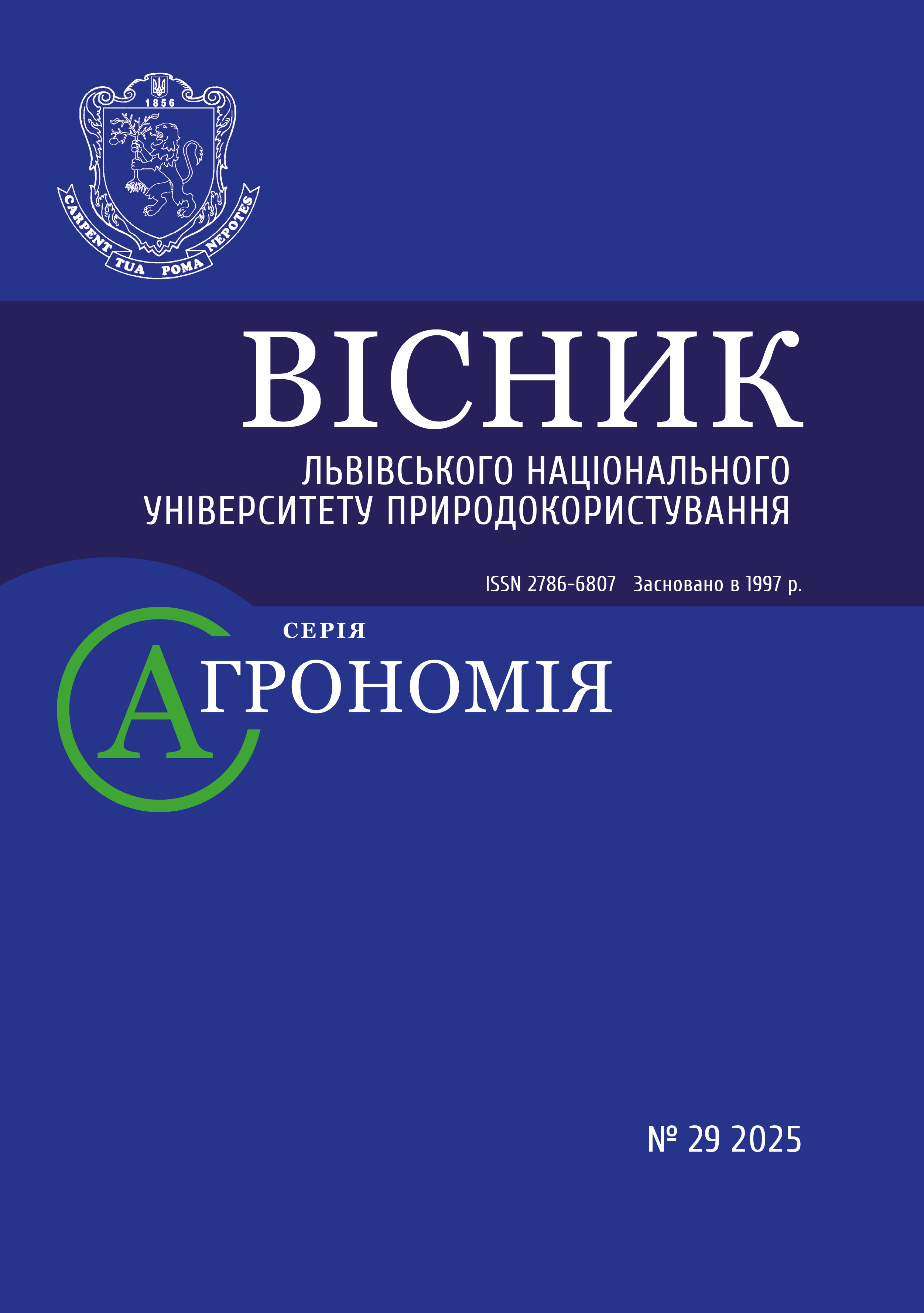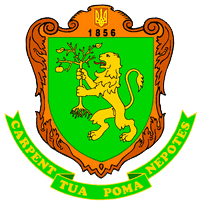WESTERN CONIFER SEED BUG (LEPTOGLOSSUS OCCIDENTALIS H.) – A THREAT TO CONIFER PLANTATIONS IN UKRAINE
DOI:
https://doi.org/10.31734/agronomy2025.29.167Ключові слова:
pest, insect, invasive species, damage, western conifer seed bug, Leptoglossus occidentalis H., pine, coniferous plants, forest, biodiversityАнотація
Coniferous plants play a vital role in park and forest plantations, both in our country and around the world. However, the areas dedicated to these plants are decreasing each year. They face numerous environmental threats and human activities, such as deforestation, destruction of parks and reserves, and the impact of pests and diseases, all of which diminish their quality. Harmful insects are among the biggest threats to both natural and artificial plantings, as their mass reproduction can lead to significant damage to the flora. Invasive insect species, in particular, pose a serious risk due to their adaptability, rapid reproduction, and ability to invade new territories, which can harm existing plant species.
One such invasive pest is the western conifer seed bug (Leptoglossus occidentalis), which was introduced to Eurasia from the Americas. Unfortunately, it is not listed as a harmful organism in Ukraine's quarantine regulations concerning plant health. This pest is atypical for coniferous vegetation in our region, yet it has managed to establish itself across the entire country due to its remarkable adaptability. The western conifer seed bug feeds on more than 40 species of coniferous plants, targeting young and mature cones and causing complete or partial destruction of seeds. Access to high-quality, viable seeds is crucial for establishing young plantations and ensuring the ability of forests to self-renew. A shortage of healthy seedlings can negatively impact the ecological functions of forest and park areas. The aim of our research was to document the presence of the western conifer seed bug in Lviv region and to determine the number of productive generations it has each year. We found that the pest has expanded its habitat and feeding range into the western Forest Steppe of Ukraine, and it had not been previously recorded in Lviv region. Currently, studies on the characteristics and impacts of the western conifer seed bug are insufficient, and there are no established recommendations for measures to prevent its mass proliferation. Therefore, the challenge of protecting and preserving productive coniferous tree plantations remains unresolved.
Посилання
Derbyniuk Yu. M., Kalinin M. I., Huz M. M., Shablii I. V. Forest seed production: monograph. Lviv, 1998. 432 p.
Determination of sowing qualities of Scots pine seeds. Ukrainian Forest Breeding Center. URL: https://ucfb.info/novini/novina/article/viznachennja-posivnikh-jakostei-nasinnja-sosni-zvichainoji.html (Аccessed January 02, 2025).
Invasive alien species. URL: https://environment-ec-europa-eu.translate.goog/topics/nature-and-biodiversity/invasive-alien-species_en?_x_tr_sl=en&_x_tr_tl=uk&_x_tr_hl=uk&_x_tr_pto=sc (Аccessed January 02, 2025).
Kalmykova Yu. K. Pine seed bug (Leptoglossus occidentalis Heidemann, 1910) and potential threat to the forests of Kharkiv region. [Kharkiv Nature Forum] 1st International conf. of young scientists. Kharkiv. Kharkiv National Ped. University named after H. S. Skovoroda, 2018. 72 p.
Kovtun O., Kosylovych H., Andrushko O., Holiachuk Yu., Stiurko M. European policy of sustainable agricultural development: challenges for Ukraine. Economic horizons. 2024. Vol. 1 (27). P. 119–138. URL: http://eh.udpu.edu.ua/article/view/305867/297376 (Аccessed January 02, 2025).
Luisa Ghelardini, Nicola Luchi, Francesco Pecori, Alessia L. Pepori, Roberto Danti, Gianni Della Rocca, Paolo Capretti, Panaghiotis Tsopelas, Alberto Santini. Ecology of invasive forest pathogens. Springer International Publication, 2017. (Published online: 21 june 2017). URL: https://www.researchgate.net/publication/317740949_Ecology_of_invasive_forest_pathogens (Аccessed January 02, 2025).
Maryna Stiurko, Olena Kovtun. Similarity as the Main Indicator of Seed Quality. Lecture Notes on Multidisciplinary Industrial Engineering. ICoWEFS 2024 Sustainability Proceedings. Springer. Switzerland, 2025. Р. 361–366. URL: https://link.springer.com/chapter/10.1007/978-3-031-80330-7_38 (Аccessed January 02, 2025).
Matsiakh I. P., Kramarets V. O. Invasions of phyllophage insects on the territory of Ukraine. Scientific works of the Forestry Academy of Sciences of Ukraine. 2020. Vol. 20. P. 11–25. URL: http://fasu.nltu.edu.ua/index.php/nplanu/article/view/516/421 (Аccessed January 02, 2025).
Mazhula O. S. Key points in the development of forest seed production in Ukraine. Forestry and Agroforestry Improvement. 2008. No 112. P. 132–134.
Mieshkova V. The pine seed bug is a threat to reforestation and afforestation. Forest herald. 2022. Vol. 1. P. 6–9.
Nikolaienko S. M. Forest reproduction and forest reclamation in Ukraine: origins, current state, current challenges and prospects in anthropogenic conditions: monograph. Kyiv, 2019. 350 p.
Norenko K. What are invasive species and how do they affect biodiversity? Ecology. Right. Man. 2018. Vol. 31 (71). P. 22–24. URL: https://epl.org.ua/human-posts/shho-take-invazijni-vydy-i-yak-vony-vplyvayut-na-bioriznomanittya/ (Аccessed January 02, 2025).
Order of the Ministry of Agrarian Policy of Ukraine dated 29.11.2006 No 716 (amended by Order of the Ministry of Agrarian Policy of Ukraine dated 16.07.2019 No 397) List of regulated harmful organisms (edition dated 03.09.2019). URL: https://zakon.rada.gov.ua/laws/show/z1300-06#Text (Аccessed January 02, 2025).
Parasitoids of Leptoglossus occidentalis Heidemann (Heteroptera: Coreidae) recovered in western North America and first record of its egg parasitoid Gryon pennsylvanicum (Ashmead) (Hymenoptera: Platygastridae) in California. URL: https://www.researchgate.net/figure/Gryon-pennsylvanicum-female-ovipositing-into-L-occidentalis-egg_fig1_234127365 (Аccessed January 02, 2025).
Patlai I. M., Molotkov P. I. Methodology of variety testing of forest species in Ukraine. Kyiv, 1994. 40 p.
Pine seed bug (Leptoglossus occidentalis Heidemann, 2010) – a dangerous invasive species in Zhytomyr Polissia. State Enterprise "Kharkiv Forest Research Station". URL: http://leshoz.org.ua/node/104 (Аccessed January 02, 2025).
Puchkov P. V., Hubin A. N., Popov H. V., Kalesnik V. N. Syzhko V. I. The North American intruder Leptoglossus occidentalis Heidemann (Heteroptera: Coreidae) settled down in Ukraine. Ukrainian Entomofaunistics. 2012. Vol. 3 (3). P. 1–3.
Puzrina N. V., Meshkova V. L., Myroniuk V. V., Bondar A. O., Tokarieva O. V., Boiko H. O. Monitoring harmful organisms of forest ecosystems. Kyiv, 2021. 274 p.
Regulation (EU) No 1143/2014 of the European Parliament and of the Council of October 22, 2014 on the prevention and management of the introduction and spread of invasive alien species. URL: https://eur--lex-europa-eu.translate.goog/legal-content/EN/TXT/?qid=1483614313362&uri=CELEX:32014R1143&_x_tr_sl=en&_x_tr_tl=uk&_x_tr_hl=uk&_x_tr_pto=sc (Аccessed January 02, 2025).


